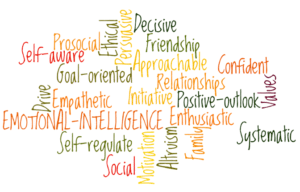Emotional Intelligence is the ability to adapt to one’s environment; to build social skills needed to navigate successfully and relate to others in ways that are meaningful. For young children, emotions tend to dictate how they feel and interact, moment by moment. As a parent and teacher it is our responsibility to guide children toward emotional intelligence so as they grow and their relationships become more complex, they have the foundation upon which to develop healthy outlook on life. Here are a few tips for helping young children understand their emotions.
1. Name them: Emotions have breadth (wide variety) and depth (complexity & profundity). Provide images of various emotions in photos, books or art, and label them. Don’t just stick to the basics (sad, happy, mad), but explore the wide variety of emotions that help us express ourselves accordingly (frustrated, jealous, disappointed, excited…).
2. Explain them: Demonstrate what those feelings may look like by acting them out and asking them to follow along, using the word associated with that feeling.
3. Relate them: Give an example of that emotion in a way that is relatable in their world. Example: When your sister gets to choose the movie it can be very frustrating!
Self-Regulation, the ability to apply restraint when necessary, plays a large role in Emotional Intelligence. The skill to recognize one’s feelings and express them in a way that is not self-harming or harmful to others takes practice and is heavily influenced by what children see in their immediate environments. Here are a couple of games that can be fun but also help with self-regulation at home.

At Crème, we use these games, as well as foster emotional intelligence with our rotations that guide children to follow a routine and develop accountability for the various expectation of each enrichment program. Our Positive Discipline practices provide opportunities to self-soothe and recognize their feelings. Our PATHS program helps children explore different ways to approach problems. Together we can foster emotional intelligence so your children enter elementary school with confidence and the skills to build lifelong friendships!
Dr. Masek
Vice President of Education

